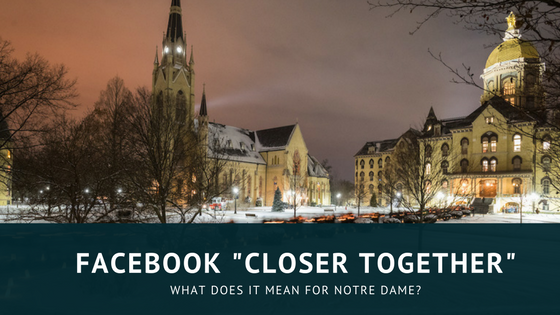On January 11, Mark Zuckerberg took to his own Facebook account to announce a major change to Facebook’s News Feed, now called “Closer Together” by the company, with the intention to make sure “the time we all spend on Facebook is time well spent.”
For Zuckerberg and Facebook, that means they want to increase the amount of content you’ll see from your friends, family and groups in your News Feed and they’re going to decrease the amount of content you see from businesses, brands and media on the platform.
While all of this sounds like it could cut down on the amount of fake news, clickbait and overall dumb posts that we all see on Facebook it will also cut down on the reach of all of our posts from pages across the University.
This isn’t the first time that Facebook has tweaked its algorithm and we’ve always managed to respond with a shift in the way we deliver content. In the past three years, we’ve worked hard to build an engaged community by delivering very strong, well-designed written content in links to articles from Strategic Content, pivoting to compelling video that can help us tell our story (like introducing Fr. Greg Boyle as the 2017 Laetare Medal recipient), and posting on a consistent schedule with a consistent tone of voice on the University’s page – but this time feels different.
Organic reach on Facebook has been declining since 2011 with a more rapid decline happening since March 2014. Many of the 65 million pages on Facebook currently average 1 to 2 percent organic reach. Many pages in higher education and publishing saw double digit declines in average organic reach in 2017.
But this is the first time that Facebook has been so open about what their plans are for brands and publishers on the platform. While in the past the company has announced algorithm tweaks that they claim will focus on friends and family, or that they will diminish the reach of posts that utilize click baiting (“Top Ten lists. You’ll never BELIEVE what number 7 is” May 2017) or engagement baiting (“Tag a friend who needs this!” December 2017) tactics. But this is the first time that Mark Zuckerberg has posted to explain a fundamental shift in Facebook’s future direction. He has said that he expects people will spend less time on the site and he is OK with that as it will be better serving the original goal of Facebook – to connect friends and family – and people will no longer be passively consuming videos or information.
While it’s always been true that Facebook’s algorithm rewards content that people engage with, it will be even more important now – and the types of engagement now has a defined hierarchy:
Likes < Reactions < Comments < Long Comments
Anything that takes longer to do on a phone (56% of Facebook users ONLY log-in on a mobile device) is weighted more heavily than things that are simple. Liking is easy, but hovering over the like button and choosing “Love,” “Haha,” “Angry” or “Sad” is harder. Saying “Congrats!” is easy, but saying something in depth and beginning a conversation is harder. Facebook will be showing those posts that provoke a reaction or in-depth comment more than it will show posts that are just liked.
So what does this mean for those of us here at Notre Dame?
The jury is still out as Facebook is rolling these changes out over the next few weeks, but it looks like it will have far reaching consequences for Facebook pages on campus especially for those accounts who are primarily trying to reach students there.
We know that students (still) use Facebook but they are primarily passive users. They check in with friends and family, follow brands and pages that they find value in, and occasionally post photos to let their parents and extended family see what they are up to. They do not often actively engage with pages or brands – they don’t comment, they don’t like and they don’t share. And more importantly, they won’t be changing their engagement behavior on Facebook, no matter how much we’d like them to so that our content will be served to as many people as possible.
That means that we’re going to either need to find out new ways to present our content on Facebook to entice them to engage (something I’ll be talking about in a subsequent blog post) or we’re going to need to discuss new ways to try to reach students either on a different social platform, by consolidating individual Facebook pages into broader focused pages or by shifting to groups under one broader focused Facebook Page umbrella.
I can tell you that the University of Notre Dame Facebook page is already seeing the effects of this News Feed change and has been for a few months. We’re primarily experiencing a decline in the reach and views of static videos. Andrew Mosseri, Facebook’s News Feed chief, has blatantly said that this is a direct result of Facebook’s desire to deliver the most engaging content to users instead of passive experiences.
“Video by nature is very passive,” Mosseri said in an interview with Wired Magazine. “So while you’re watching a video on Facebook you don’t tend to comment a lot, like a lot, or talk with your friends a lot, or read articles for that matter.”
I’ll continue to blog about our experiences with Facebook as these news feed changes take hold in the market. Check in for a blog post on what we can do to promote engagement and try to combat this decline in organic reach soon.
